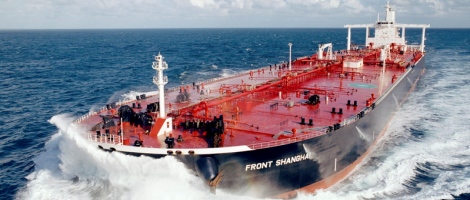Bermuda Firms Hit By Tanker Glut
 Bermuda-based owners of supertankers, losing money for a sixth consecutive quarter, are among the global operators who will probably idle the most ships in more than two decades as they contend with a glut that has driven charter rates to the lowest in at least 14 years.
Bermuda-based owners of supertankers, losing money for a sixth consecutive quarter, are among the global operators who will probably idle the most ships in more than two decades as they contend with a glut that has driven charter rates to the lowest in at least 14 years.
The combination of too many ships and slowing demand growth for oil means that about six percent of the global fleet will be anchored in a year from almost none now, according to a Bloomberg report this week.
That may not be enough to end the slump. Forward freight agreements, traded by brokers and used to bet on transport costs, anticipate rates no higher than $13,819 a day through 2013.
Frontline Ltd., the biggest operator of the vessels, says it needs $29,800 to break even. The Hamilton, Bermuda-based company will report its biggest annual loss in 12 years in 2011, analysts’ estimates compiled by Bloomberg show.
“When it’s this bad, eventually it wears people down a bit and some do get out of the market,” said Martin Stopford, the London-based managing director of Clarkson Research Services Ltd., a unit of the world’s biggest shipbroker. “To lay the ship up, you would eventually have to totally lose confidence in the market improving for some time.”
The global fleet of very large crude carriers expanded about nine percent to 570 ships in the past two years, the most since 1983, Clarkson data show. Owners ordered the greatest number of new vessels since the 1970s between 2006 and 2008, when charter rates surged to as much as $289,000.
Those tankers started joining the fleet just as global demand for oil fell by the most in 27 years.
Demand for oil tankers will match fleet capacity by the Northern Hemisphere’s next winter, lifting charter rates, Peter Evensen, the CEO of Teekay Corp., said in an interview in London with Bloomberg. The Hamilton, Bermuda-based company is the largest US-listed owner of the ships.
Rates have averaged less than Frontline’s breakeven since the third quarter of 2010. Daily returns from the vessels in the spot market averaged $11,372 in the third quarter, the lowest since at least 1997, according to Clarkson.
Oil is the single biggest commodity transported by sea, according to Clarkson. Trade will total about 1.9 billion metric tons this year, compared with 1.1 billion tons of iron ore and 921 million tons of coal.
As many as 168 tankers of all sizes were removed from the fleet in 2009 to store oil for companies seeking to profit from longer-dated energy futures trading at a premium to contracts for immediate delivery. Idling six percent of global supertankers anticipated in the Bloomberg survey would be equal to about 34 vessels.
Frontline will report a loss of $85.8 million this year, compared with profit of $161.4 million in 2010, according to estimates compiled by Bloomberg. The company will also be unprofitable for the next two years, the estimates show. Its shares fell 82 percent in Oslo trading this year, on track for the biggest annual decline in 13 years.

